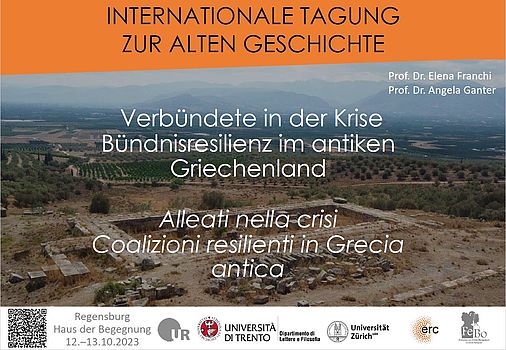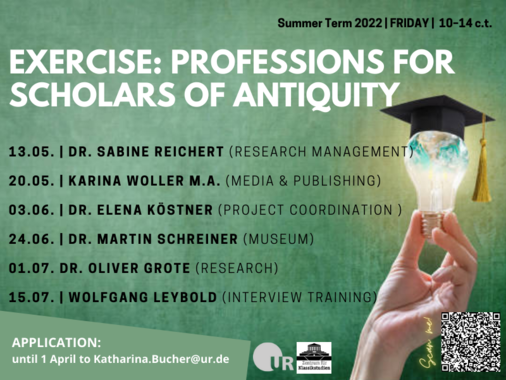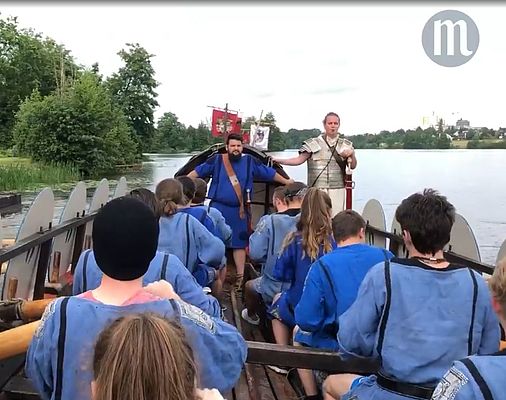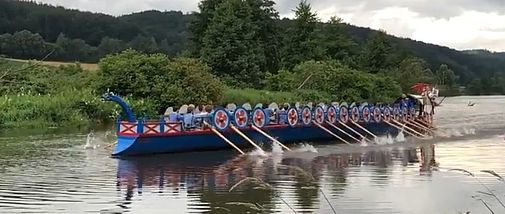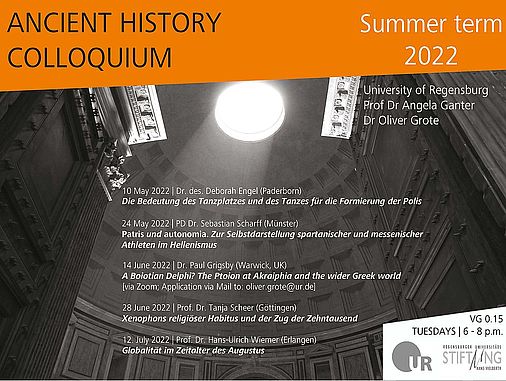Notes
Exercise: Professions for Scholars of Antiquity
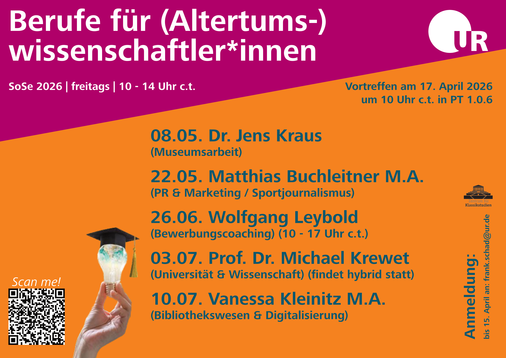
Every summer term, we offer a career-oriented exercise especially for students of Classics.
Verbündete in der Krise. Bündnisresilienz im antiken Griechenland //
Alleati nella crisi. Coalizioni resilienti in Grecia antica
Regensburg, Haus der Begegnung, 12.–13. Oktober 2023
Krisen sind in aller Munde. Die inflationäre Verwendung des Begriffs vermittelt den Eindruck, in einer Zeit der Dauerkrisen zu leben. Ist der Begriff angesichts seiner Allgegenwart in der Alltagskommunikation wissenschaftlich überhaupt noch operationalisierbar?
Die Konferenz geht von einer doppelten Affinität gegenwärtigen Krisenempfindens mit lebensweltlichen Verhältnissen im antiken Griechenland aus. Erstens bestimmt die Selbstdiagnose als einer Epoche der Dauerkrisen die Krise als Normalzustand. Zweitens haben Krisenkonzepte der Antike nichts mit einem modernen, auf Revolutionen gerichteten Krisenverständnis zu tun. Krisen in der Antike sind vielmehr von ihrer systemimmanenten und damit auch systemerhaltenden Funktion her zu denken. Insofern erweist sich Resilienz hier als Schlüsselkonzept. Das Anliegen der Tagung besteht darin, eine solche Neuakzentuierung des Krisenbegriffs im Kontext diverser Bündniskonstellationen zu diskutieren.
Der Fokus der Tagung liegt auf der Erprobung eines neu ausgerichteten Krisenbegriffs, der es erlaubt, Auseinandersetzungen zwischen Bündnern nicht primär als Vorboten eines Bündniszerfalls, sondern als Kreativität herausfordernden Dauerzustand bilateraler und föderaler Gebilde anzusehen. Die Krisenhaftigkeit griechischer Bündnisse soll akteurszentriert aus etischen und emischen Perspektiven diskutiert werden, um sie als fruchtbaren Faktor von Transformation zu verstehen. LINK zum Tagungsprogramm ist demnächst verfügbar
ITALIANO
Le crisi sono sulla bocca di tutti. L'uso inflazionato del termine dà l'impressione che viviamo in un'epoca di crisi permanenti. Data la sua onnipresenza nella comunicazione quotidiana, il termine può ancora essere reso operativo scientificamente?
La conferenza ipotizza una doppia affinità tra l'attuale senso di crisi e le condizioni di vita dell'antica Grecia: In primo luogo, l'autodiagnosi come epoca di crisi permanente determina la crisi come uno stato normale. In secondo luogo, i concetti di crisi nell'antichità non hanno nulla a che vedere con la moderna concezione di crisi rivolta alle rivoluzioni. Piuttosto, le crisi nell'antichità devono essere pensate in termini di funzione immanente al sistema e quindi anche di mantenimento del sistema. In questo senso, la resilienza si rivela un concetto chiave. L'obiettivo della conferenza è discutere questa nuova accentuazione del concetto di crisi nel contesto di diverse costellazioni di alleanze.
L'obiettivo della conferenza è quello di testare un nuovo concetto di crisi che ci permetta di vedere le dispute tra alleati non principalmente come foriere di un collasso dell'alleanza, ma piuttosto come uno stato permanente di sfida alla creatività delle strutture bilaterali e federali. La natura di crisi delle alleanze greche sarà discussa da prospettive sia etiche che emiche, al fine di comprenderle come un fecondo fattore di trasformazione.
LINK al programma della conferenza sarà disponibile a breve
ENGLISH
Crises are on everyone's lips. The inflationary use of the term gives the impression that we live in a time of permanent crises. In view of its omnipresence in everyday communication, is the term still suitable in scientific contexts?
The conference assumes a double affinity between the current sense of crisis and the conditions of life in ancient Greece. Firstly, the self-diagnosis as an epoch of permanent crises determines the crisis as a normal state. Secondly, concepts of crisis in antiquity have nothing to do with a modern understanding of crisis directed towards revolution. Rather, crises in antiquity are to be thought of in terms of their system-immanent and thus also system-maintaining function. In this respect, resilience proves to be a key concept here. The aim of the conference is to discuss such a new accentuation of the concept in the context of diverse alliance constellations.
The focus of the conference is on testing a new concept of crisis that allows us to view disputes between allies not primarily as precursors of alliance collapse, but rather as a creativity-challenging permanent state of bilateral and federal structures. The crisis-ridden nature of Greek alliances will be discussed from both etic and emic perspectives to understand them as a fruitful factor of transformation.
LINK to the conference programme is to be expected soon.
Consultation hour Prof. Dr Angela Ganter
Prof. Dr Angela Ganter's consultation hours take place on Thursdays between 1 and 2 p.m. by appointment in person (office PT 3.1.49), digitally via Zoom or by telephone. To make an appointment, please write an email to Marion Pinkawa (marion.pinkawa@geschichte.uni-regensburg.de) stating your preferred date and time and your preferred means of communication. Mrs Pinkawa will then assign you an appointment and, if necessary, a Zoom link.
Exercise: Professions for scholars of antiquity
Every summer term, we offer a career-oriented exercise especially for students of Classics.
Master's programme "Ancient History – Classical Studies“
The new Master's programme "Ancient History – Classical Studies" started in the winter semester 2021/22 at the University of Regensburg.
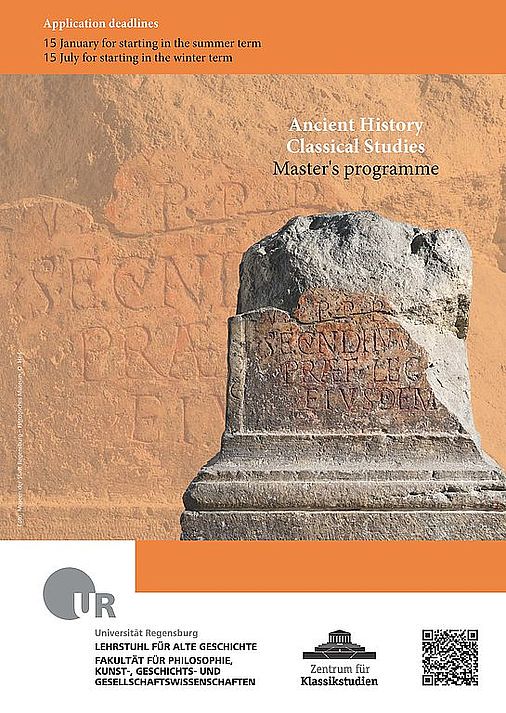
For more information click here.
Christmals Lecture 23 December 2021

Navis Lusoria 'Regina' on the Naab again
After a year and a half of corona break, our faithful replica navis lusoria 'Regina' is back on the river at the Naabspitz in Mariaort. In addition to the first school classes that visited us, we were also able to carry out some trips as part of a student exercise. On 8 July, a team from the Mittelbayerische Zeitung accompanied us:
(By clicking on one of the pictures you will get to the video report of the MZ).
Groups/school classes interested in a trip should contact the project leader Dr Heinrich Konen (+49 941 943 3716 or heinrich.konen@ur.de).
Exam Preparation Ancient History
You can find the dates of the state examination preparation in Ancient History in SPUR; more detailed information can also be found in the GRIPS course "State Examination Preparation Ancient History WS 22".
Former latest news are available in our archive.
Lectures
Upcoming lectures and events of the chair can be found in the calendar of events.
Ancient History Colloquium of the summer term 2022:
Holiday Consultation Hours
Holiday Consultation Hours
Prof. Dr. Angela Ganter
24 Februar 2022 1 - 2 pm
17 März 2022 1 - 2 pm
7 April 2022 1 - 2 pm
… and by appointment. Please make an appointment with Mrs Marion Pinkawa.
Dr. Oliver Grote
by appointment
Dr. Heinrich Konen
by appointment
Katharina Bucher M.A.
by appointment
Adrian Linz
23. Februar 2022 3 - 4 pm
2. März 2022 3 - 4 pm
30. März 2022 3 - 4 pm
… and by appointment. Please send an Email.



